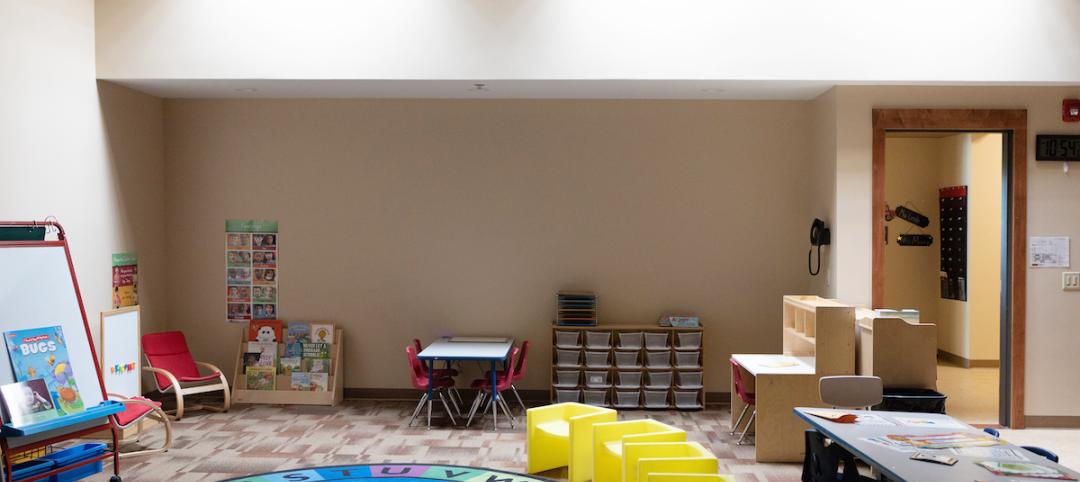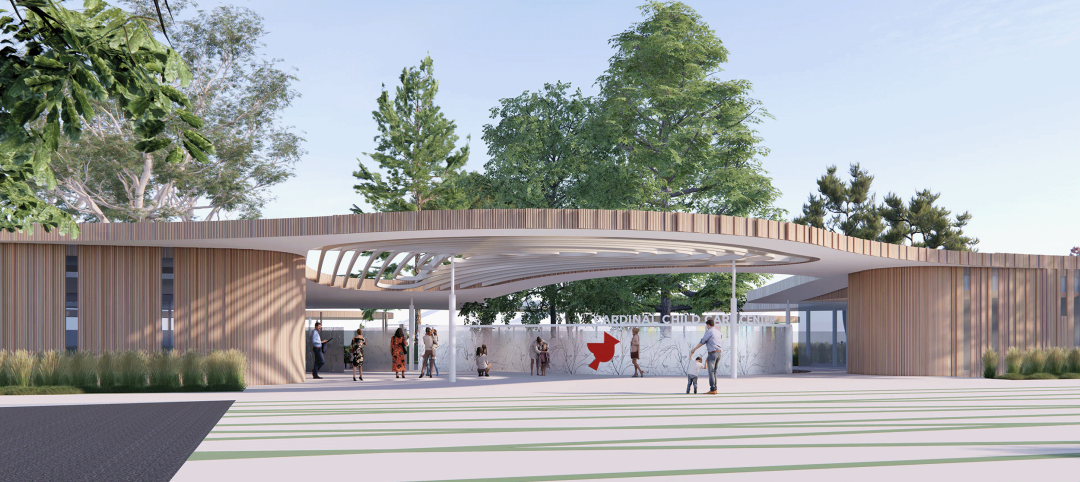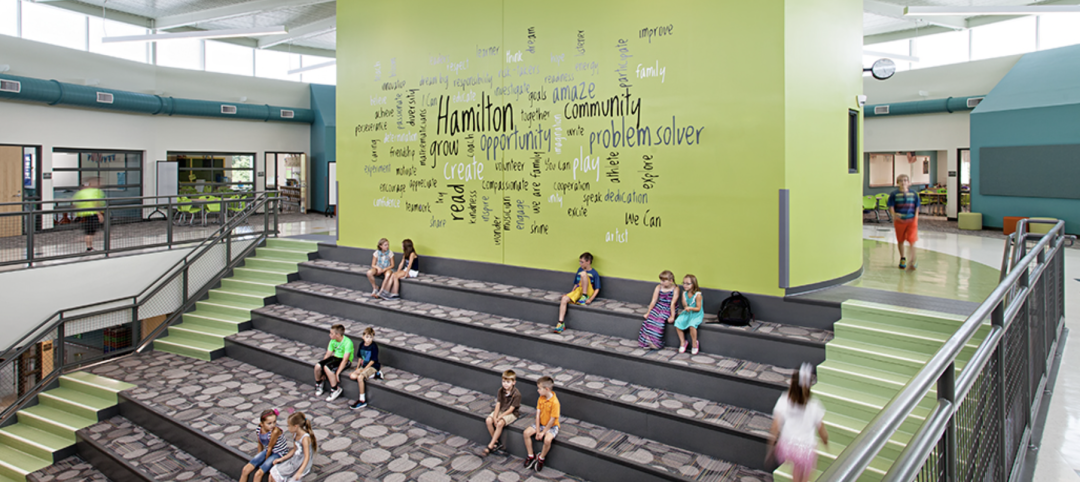 |
| The Haverford School campus was active during construction, so the soccer team had to practice within 10 feet of where the Upper School’s site fencing had been erected. |
Imagine this scenario: You're planning a $32.9 million project involving 112,000 sf of new construction and renovation work, and your job site is an active 32-acre junior-K-to-12 school campus bordered by well-heeled neighbors who are extremely concerned about construction noise and traffic.
Add to that the fact that within 30 days of groundbreaking, the general contractor gets canned. And one more thing: you have 15 months until the school bell rings.
This nightmare situation is exactly what Mike Rufo faced as construction manager for The Haverford School, a private school for 981 boys, on Philadelphia's Main Line. Rufo, owner of Rufo Contracting Inc. of Conshohocken, Pa., had worked with the school since 1992, when the institution launched a 15-year program to upgrade its campus. The project in question—construction of a new Upper School building and a new library totaling 87,000 sf and the renovation of Wilson Hall, the school's original 25,000-sf, 1903 classroom building—would be his last for the client, and one he would not forget.
 |
| The brick and glass Upper School (above) angles around to create a nook for the amphitheater. The 87,000 sf of new construction connects to the renovated Wilson Hall (below) to create the school’s new face. |
 |
In July 2007, with the original GC out, Rufo's most pressing concern was finding a qualified replacement—fast! Three firms looked at the project schedule and turned him down flat. With less than 400 days before the opening day, Rufo contracted with INTECH Construction of Philadelphia. The new GC took over a job site where demolition had started, the first foundations had been poured, the installation of sheeting, shoring, and soil nailing had begun, and steel was on order.
INTECH also inherited a project located in a residential neighborhood where on-site work was limited to the hours from 8 am to 6 pm, and never on Sunday. Deliveries could not be made using residential streets. Well-connected neighbors made sure these rules were enforced.
INTECH's first task was reassuring the remaining Building Team members—including a number of worried subcontractors and the equally nervous designer—that the project schedule could be met. Philadelphia-based MGA Partners Architects had worked with INTECH before, but they were concerned that the grueling timeline would force INTECH to value engineer the project and make compromising design modifications.
 |
| Numerous gathering and work spaces scattered throughout the project, including a columned seating area (top) and glass meeting pods (below), are designed to foster collaborative learning and social interaction. |
 |
MGA's design called for the combined Upper School building and Wilson Hall to become the new face of the campus. The new brick, glass, and steel facility would be connected to the renovated fieldstone and wood-framed Wilson Hall via a glass and limestone entrance pavilion. The sleek new Severinghaus Library would be tucked behind the 105-year-old Wilson Hall. Extensive glazing and curtain wall construction would open up the buildings to the outside, flooding the well-equipped and highly detailed classrooms, science labs, art studios, study nooks, and gathering spaces with daylight. The architects designed the project to achieve LEED Gold certification (still pending).
Rather than compromise the building's design integrity or sustainability efforts, INTECH instead reworked the schedule to break things down into more manageable chunks, called fragnets—for “fragmented networks of sub-projects”—to sequence the work more effectively. INTECH also asked MGA to provide an on-site architect so that decisions about any absolutely necessary modifications could be made quickly and in keeping with the original design intent. The cost of an on-site architect was not in the school's original budget, but the headmaster, Dr. Joseph Cox, realizing the value of having an MGA architect on site, pushed through approval of the additional expense.
The new sequencing scheme made all the difference. For example, the Building Team reworked the schedule so that interior work on the Upper School building could begin early. Fabrication of the project's cast stone detailing was more closely coordinated with the installation of the brick walls. The millwork and casework packages were reworked to comply with the integrity of the design but at a lower cost. Architectural metals and ornamental stairs were modified so that they could be installed faster, with no negative impact on the design intent.
Last-minute on-site changes like these can kill a project schedule, but the opposite was true at The Haverford School. The entire project was completed in August 2008—just in time for the start of the academic year.
“They did a great job on schedule,” said Building Team Awards judge Tracy Nicholas, VP, Alter Construction Management of Skokie, Ill. “There was great collaboration. Logistically, this was a difficult job with multiple departments, and they still did it all in 15 months.”
Related Stories
K-12 Schools | Jan 25, 2023
As gun incidents grow, schools have beefed up security significantly in recent years
Recently released federal data shows that U.S. schools have significantly raised security measures in recent years. About two-thirds of public schools now control access to school grounds—not just the building—up from about half in the 2017-18 school year.
ProConnect Events | Jan 16, 2023
6 more BD+C ProConnect Events in 2023 – The videos show why you should participate
ProConnects bring building product manufacturers and suppliers together with architects, contractors, builders, and developers to discuss upcoming projects and learn about new products and technical solutions.
K-12 Schools | Dec 23, 2022
Vacant Target store in Minnesota turned into early childhood education center
Lincoln School, a former 90,000-sf Target retail store in Fergus Falls, Minn., was repurposed into Independent School District 544’s newest campus.
Multifamily Housing | Dec 21, 2022
Bay Area school district builds 122 affordable apartments for faculty and staff
The 122 affordable apartments at 705 Serramonte, Daly City, Calif., were set aside not for faculty and staff at Jefferson Union High School District.
K-12 Schools | Dec 20, 2022
Designing an inspiring, net zero early childhood learning center
LPA's design for a new learning center in San Bernardino provides a model for a facility that prepares children for learning and supports the community.
Sponsored | Resiliency | Dec 14, 2022
Flood protection: What building owners need to know to protect their properties
This course from Walter P Moore examines numerous flood protection approaches and building owner needs before delving into the flood protection process. Determining the flood resilience of a property can provide a good understanding of risk associated costs.
HVAC | Dec 13, 2022
Energy Management Institute launches online tool to connect building owners with HVAC contractors
The National Energy Management Institute Inc. (NEMI) along with the Biden administration’s Better Air in Buildings website have rolled out a resource to help building owners and managers, school districts, and other officials find HVAC contractors.
Education Facilities | Nov 30, 2022
10 ways to achieve therapeutic learning environments
Today’s school should be much more than a place to learn—it should be a nurturing setting that celebrates achievements and responds to the challenges of many different users.
K-12 Schools | Nov 30, 2022
School districts are prioritizing federal funds for air filtration, HVAC upgrades
U.S. school districts are widely planning to use funds from last year’s American Rescue Plan (ARP) to upgrade or improve air filtration and heating/cooling systems, according to a report from the Center for Green Schools at the U.S. Green Building Council. The report, “School Facilities Funding in the Pandemic,” says air filtration and HVAC upgrades are the top facility improvement choice for the 5,004 school districts included in the analysis.
Energy-Efficient Design | Nov 14, 2022
How to achieve net zero energy in five steps
Martine Dion and Ethan Seaman share net zero energy best practices with owners and developers.















